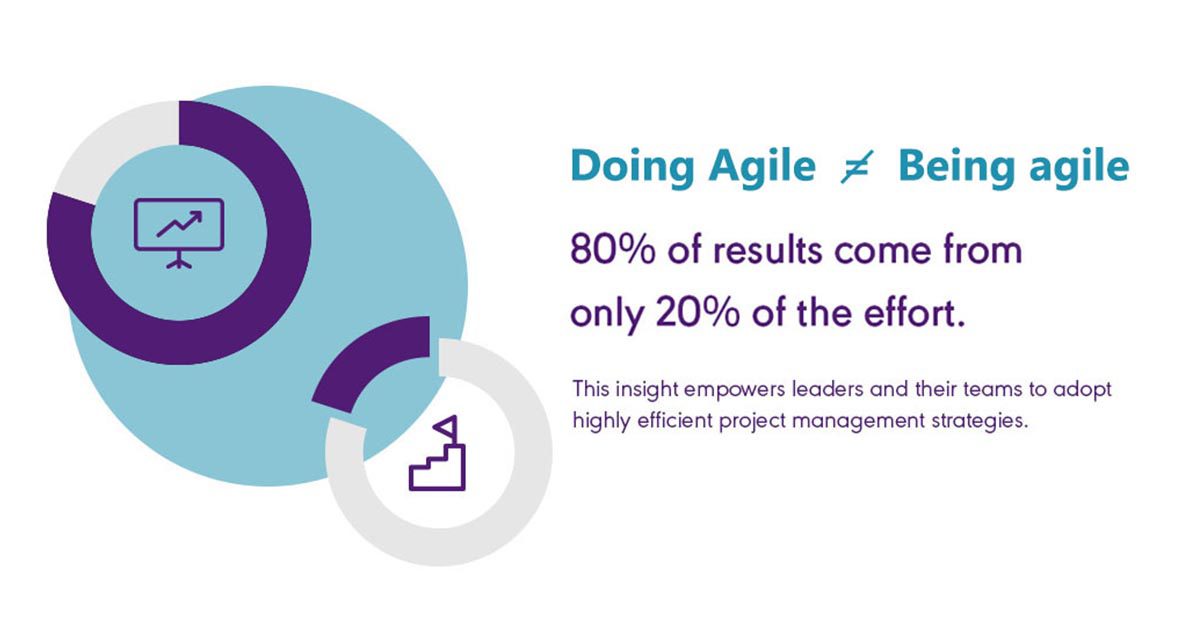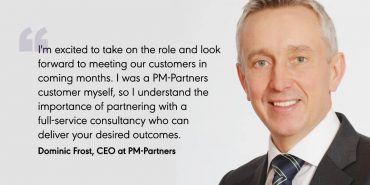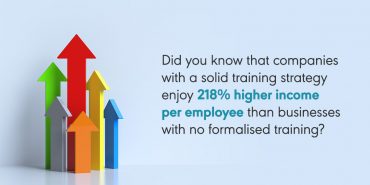Gaining true business agility with Agile

Agile is not just some buzzword floated by the C-suite in order to drive greater productivity. Such is its power to revolutionise organisations that its practices have become ubiquitous across virtually every large (and not-so-large) organisation. But there’s a risk that adopting Agile solutions and being ‘agile’ are not taken together as a pair.
NOT A SET-AND-FORGET SOLUTION
Agile’s implementation has been seemingly commoditised to the point where it is rarely questioned or examined. Many organisations can point to the sticky notes on the wall or the daily stand-ups from their software team.
“Ah yes – Agile,” we hear management say. “I’ve heard it works for the IT department. In fact, I just approved even more licences for Jira for them. But us? Oh, Agile isn’t really for management.”
They then pat themselves on the back for a job well done.
But what happens when Agile doesn’t deliver on the promised benefits? All too often organisations give up on it without allowing sufficient time to review whether the return was worth the investment. They figure nothing has changed immediately and throw the baby out with the bathwater – never to be mentioned again.
A few months down the track and things still aren’t any better in the office. The Agile talk starts up again. “Our competitors are doing it,” a board member says, and suddenly the C-suite is sending company-wide emails with a zealous proclamation: “We’re going to be an Agile organisation!”
With that decision from the top, like it or not, management needs to do something about it – even if they don’t really know what it is. “Do I need to stock up on more sticky notes?” they ask themselves. “Do I need to learn Jira or start standing up every morning? How can I even do that in my area?”
Sound familiar?
FAIL TO PLAN, FAIL TO BE AGILE
This is a common scenario we see time and time again. If there is no effective plan in place for Agile implementation, it leads to confusion, false starts and – in the worst-case scenarios – reputational damage. The opportunity to become truly agile is missed, and the reasons for wanting to achieve business agility are lost.
So, what should an organisation consider if they want to cross the chasm into ‘the Agile promised land’ they seek?
AGILE, MADE EFFECTIVE
The most important thing to remember when embarking on this type of journey – but especially the transition to Agile – is that it’s not just a project-delivery framework.
Effective Agile is a set of principles – it is a mindset shift at all levels of the organisation. It will fundamentally impact how every individual perceives their role and contribution to a shared organisational vision. It is a deliberate set of cultural, organisational, change and leadership behaviours that empower everyone to become an agent of change.
Yes, frameworks and processes can help enable some of this change, but focussing on these alone is not how an organisation will experience the full benefits of Agile. Instead of focusing on how to ‘do Agile’, we need to instead learn what it means to ‘be agile’.
THE FUNDAMENTAL DISTINCTION BETWEEN AGILE AND AGILE
● Big ‘A’ Agile (noun): Relating to or denoting a method of project management, used especially for software development, that is characterised by the division of tasks into short phases of work and frequent reassessment and adaptation of plans.
● Small ‘a’ agile (adjective): Able to move quickly and easily; able to think, understand and respond quickly.
The former is a process-driven definition, implemented through the adoption and adaptation of frameworks. These frameworks are typically within projects and PMOs and driven upwards through the organisation.
Achieving the latter, on the other hand, is more esoteric. It’s typically a change-driven initiative characterised by deliberate cultural, leadership, behavioural and mindset shifts – all driven from the top-down in an organisation.
DIFFERENT APPROACHES MADE MORE POWERFUL WHEN COMBINED
These are fundamentally different approaches, but they need to work in harmony if you want a successful outcome for your organisation. Management teams that spend too much time, money and energy on the ‘big A’ without really investing in the ‘small a’ will invariably endure a poor Agile implementation – one that’s doomed to fail. And we have all seen examples of this.
These organisations falsely believe that shoehorning an Agile framework into their business model – without changing the rest of the company around it – will fix all their problems. When that inevitably doesn’t happen, they become disillusioned, they give up on Agile, nothing changes, and they go around and around in circles ad nauseam.
THE REAL SILVER BULLET
Organisations that appreciate and invest in changing their structure and their culture will ultimately become more agile – more agile in the way they plan, think and execute their strategies. They will also naturally become more customer-focused and value-driven.
It’s here that we see the real value and benefits of Agile. The 80/20 rule applies here – focus 80% of your efforts on ‘being’ agile as an organisation, and 20% on ‘doing’ Agile. Find that happy balance, and your chance of a successful transformation that delivers true organisational benefits skyrockets – with or without those Jira licences and sticky notes!
Is your organisation looking to harness the power of Agile? Reach out to the experts at PM-Partners today or call us on 1300 70 13 14.

About The Author
Matt Sharpe
Agile Principal Consultant and Practice Lead at PM-Partners
Matt is our Agile Principal Consultant and Practice Lead, with significant experience in advisory and consulting, strategic transformation, project, programme and portfolio management. Matt is a Certified Scrum Professional, with over 15 years experience working in the Agile space across Europe, The US, Asia, the Middle East and Australia.
Matt has worked at all levels of project delivery in both Waterfall and Agile modes ranging from single sprint deliverables through to multi-year agile portfolios exceeding $100m, as well as the design, planning, execution and management of agile transformations and capability uplifts in several organisations and industries across the world.







